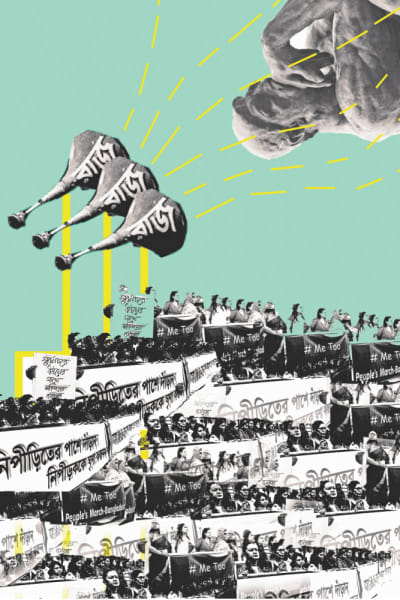What men think about #MeToo

The #MeToo movement that burst into the spotlight in Hollywood in 2017 dismantled many perpetrators from their positions of power and prestige. Although the movement did not have the same impact in Bangladesh—with fewer women speaking up publicly—the men here were also certainly ‘shaken up’. In the aftermath of the storm, their heightened sensitivity of women’s safety and respect in the public sphere comprised a healthy dose of mockery, gaslighting, and a fear of engaging in social and personal relationships with women at all, lest they turn into monsters and unjustly frame them for misconduct to ruin their social lives. 75 percent of the female respondents of Star Weekend’s anonymous online survey this April admitted to having faced some sort of harassment in their current and former workplaces. This time, we decided to speak to several men on what changes they see after the #MeToo movement in Bangladesh. The responses were eye-opening.
Some men acknowledged that their behaviour sometimes had been inappropriate, making their female colleagues feel uncomfortable, and that now they are more aware of their behaviour. “Right after the movement, I became more conscious of any language I used that could possibly offend my female colleagues. I started making an effort not to use any words that have a double meaning or crack any jokes which make them uncomfortable in front of myself or my other male colleagues,” says F Islam, whose senior colleague has allegedly harassed a female employee he worked with.
Another says that he now thinks twice before hugging a female colleague when greeting them. “I know that women can differentiate between a regular and a ‘creepy’ hug, but now I am more aware of how they react. Because what I am considering a warm greeting might be awkward for someone else. So, I have tried to check this behaviour in general,” he says. “At the same time, I have now become more conscious of taking part in sexist jokes by my other [male] colleagues or commenting on one’s look or appearance. We consider it fun but they might feel offended.”
The #MeToo movement has also served as a warning to employers who have started rechecking gender sensitiveness in their official codes of conduct. Mostafizur Rahman, senior manager at a research organisation, says although his office is quite gender-sensitive in his opinion, male employees have been instructed to maintain maximum sensitivity while interacting with their female colleagues. “We have instructed them to behave with their female colleagues by keeping in mind Bangladeshi culture and norms. After this, we found that some of those men who used to talk to their female colleagues by lurking in their cubicles or standing behind them have stopped such practices. Such behaviour is not condoned at our office.”
“In fact, one of our male colleagues also suggested female colleagues not touch the men on their shoulders or backs because many men take it as a signal. In our society, many men do not acknowledge that this can be completely innocent and these men may misinterpret such friendly gestures by a female colleague as romantic or sexual interest,” he adds.
Other male employees have chosen to minimise the risk of sexual harassment or misconduct by simply avoiding contact with female employees unless absolutely necessary. Although segregation cannot be a solution to sexual harassment in the workplace, many have chosen to do this to keep themselves in the clear. Five of the 15 male employees Star Weekend spoke to said that they now avoid handshakes, one-on-one meetings, outings, chit-chat and socialising with their female colleagues.
“I tried to keep all interactions and chit-chat limited to work-related topics only. Besides, although we used to hang out with our colleagues outside the office or go to dinner frequently, now it has changed to a great extent. Earlier, we made work trips frequently. But now we try to bring along our family members on those trips,” says N Uddin Ahmed, a senior manager at a financial institution.
A number of the men talked about how they are afraid of being falsely accused of sexual misconduct. Journalist Farhan Habib says he has lost his trust in women after the movement. “I am confident in that I maintain a good moral character and I am always careful with my words. But I can share a small incident related to this. One of my junior female friends, who is quite fond of me, once invited me to meet her. After that meeting, I realised that she was preparing to propose, but I wasn’t interested. Later, I stopped talking to her, fearing that I might get into trouble if I continue to communicate with her. In fact, it could happen that maybe I want to propose to a girl and she doesn’t respond the same way. But later, she can spread the screenshots and bring a charge against me for proposing to her,” he adds.
The same experience was shared by F Islam—he fears that he may be socially ostracised without being able to defend himself. One of his friends from another workplace was quite worried about having had an affair with a colleague, which ended badly. “My friend was afraid that the woman would bring a charge against him to ruin his social life. When two people are in a relationship, it is common to have personal conversations. But if these are intentionally presented from just one side, there is a great chance of being misunderstood by others. And once an allegation is made, people start to talk about it on their own and they don’t wait to find out the rest of the story,” Islam adds. “This is not my friend’s concern only; I know many others who have the same worry.”
#MeToo was also unable to create a significant impact in the entertainment industry. According to television director Ashfaque Nipun, the reason is easily understandable. “If an actress brings an allegation against someone very powerful in this industry, the other party (be it actors, directors or producers) will stand against her with a #YouToo—meaning she had consented to the incident. This stops girls from speaking up,” he explains.
“But if we think about the overall situation, yes, they [the men] have become more cautious. Earlier, harassing someone sexually was a minor matter to them,” he adds. Nipun believes that social media has been playing a great role in this regard. “Now they have started to care because they don’t want to tarnish their public image on Facebook or other social platforms, to be tarnished.”

 For all latest news, follow The Daily Star's Google News channel.
For all latest news, follow The Daily Star's Google News channel. 



Comments